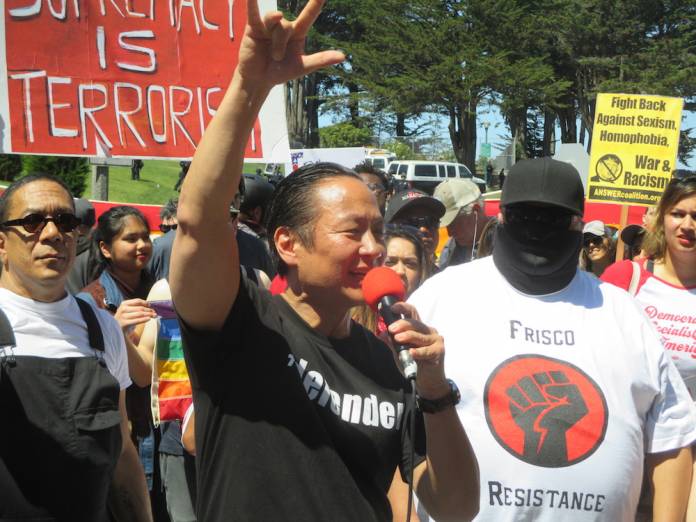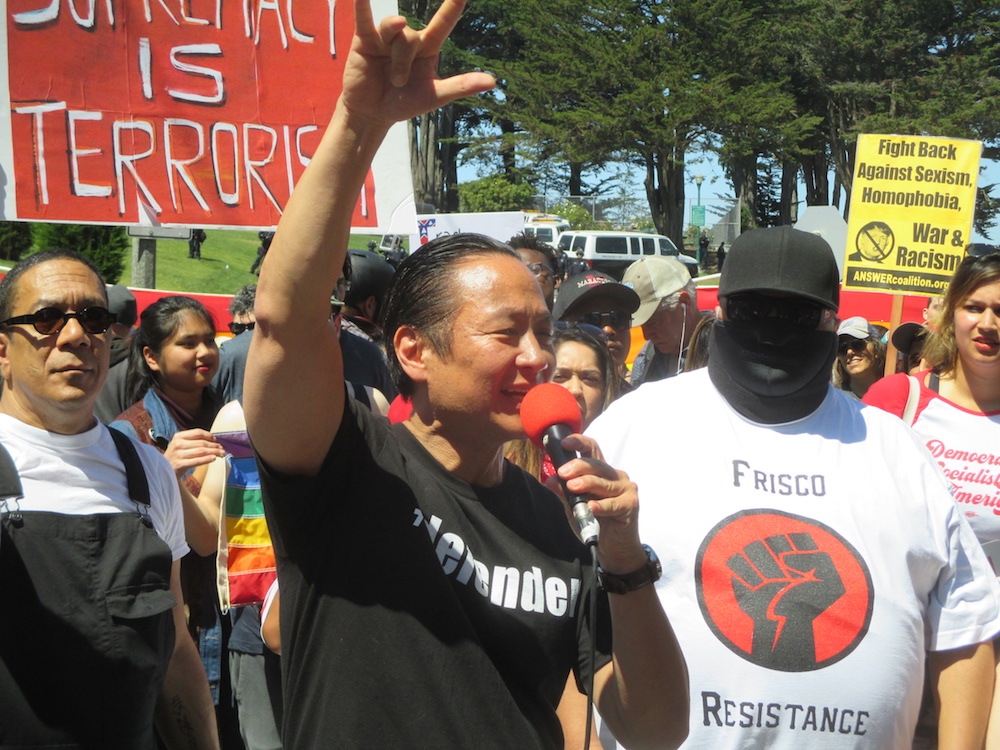
The national news media still seems to be talking about the relatively minor incidents of violence in Berkeley when the white supremacists came to town last weekend. I have read so many anguished Facebook posts by people who say the “antifa” are ruining the progressive movement, that violence has no place in politics, and that we are tarnishing the history of the civil rights movement.

As I said before: I’m not condoning violence. I think the vast majority of the protesters I saw were peaceful. And now this from four Christian clerics who are all supporters of nonviolence:
The civil rights movement was messy, disorderly, confrontational and yes, sometimes violent. Those standing on the sidelines of the current racial-justice movement, waiting for a pristine or flawless exercise of righteous protest, will have a long wait.
So let’s not get all agitated about the antifa. Most of what happened last weekend was wonderful. Nobody got seriously injured. As Nato Green notes, the whole day had less violence than most major sporting events. A few fistfights do not amount to an outpouring of violence.
And on to this week.
Official San Francisco is back in business after the summer recess, and the Board of Supes Tuesday/5 will, among other things, consider an appeal of the One Oak project, with the state of the city’s transportation system on congested Market Street in the balance.
The way these things tend to go, the board gives a lot of deference to the supervisor from the district where the project is based — in this case, London Breed. Since this is an appeal, the supes can’t talk in advance about how they vote; Breed, like many of her colleagues, seems to prefer working out deals with developers and the community instead of killing big projects altogether.
This time, though, the appellant, San Francisco State Professor Jason Henderson, isn’t looking for more affordable housing or community amenities (although he would, I’m sure, love to see more of both).
He’s not even trying to block the whole project; he told me he could support it, with some changes.
But he wants the city to overhaul the way it does transportation studies, to get a grip on how Uber, Lyft, delivery services and tech shuttles will impact a busy intersection when you add 304 new high-end condos. And he wants the building to comply with the code for parking, which would mean only 25 percent of the units would come with a parking space.
The developer, Build Inc., has insisted that a project without more parking won’t work; rich people aren’t going to buy multimillion-dollar condos if they don’t have a place to put their cars.
The hearing starts at 3pm in the Board chamber.
The state Legislature is already back in session, and a long list of key bills are either pending or dead.
A measure that would have made it harder for citizen initiatives to opposed development is dead for the year — thanks, tenant advocates say, to the growing power of the state’s tenant-rights movement.
“We welcome the demise of this misguided landlord-sponsored bill,” noted Dean Preston, executive director of Tenants Together, California’s statewide organization for renters’ rights. “Landlords already have too much political power thanks to the corrupting influence of money in politics – we don’t need Sacramento rewriting local election laws for their benefit.”
AB 943, backed by the real-estate industry, sailed through the state Assembly, but ran into trouble in the Senate as tenant groups organized and managed to block in. The Appropriations Committee put the bill on “suspense,” meaning it’s dead for the year.
The Assembly Appropriation’s Committee gutted Sen. Scott Wiener’s bill that would allow cities to extend alcohol-service hours to 4am, leaving it as nothing but a study — which probably means that bill, which was strongly supported by the SF nightlife industry, is also dead for the year.
On the other hand, SB 35, the Wiener bill that would promote more market-rate housing development in the mistaken belief that more luxury condos will bring housing prices down, will come to the Assembly floor any day now. Fernando Marti, co-director of the Council of Community Housing Organizations, and I were on KQED Forum Friday debating this bill with Laura Foote Clark, executive director of Yimby Action; you can listen to the show here.
What I told Clark was that the whole premise of SB 35 is false. No housing gets built without financing, and most financing comes from investors who want the maximum rate of return. The private market right now will never build housing for the middle class. If you built so much that prices started to soften, that money would go elsewhere.
Much of the affordable housing that cities get comes from forcing developers into building more below-market units than they want. Take away that tool and you will get less affordable housing. Not surprisingly, the landlords and developers are among the biggest backers of this bill, and tenant and anti-eviction groups are against it.
Meanwhile, there are two bills that address criminal sentencing enhancements that Public Defender Jeff Adachi is supporting, and both of them will come up for a vote in the next few days. SB 180, by Sen Holly Mitchell, would repeal the three-year sentence enhancement for prior drug offenses. The enhancement are cumulative — you get two drug offenses, your next included an extra six years. Three priors, and you get nine more years. This has, of course, done nothing to slow drug abuse, but has forced thousands of people, mostly young men of color, into long, pointless (and expensive) stints in prison.
SB 620, by Sen. Steven Bradford, is a pretty modest proposal that would allow judges to adjust the mandatory 10-year enhancement for gun-related crimes. Right now, if you are caught with a gun during a felony, you automatically get an additional 10 years — which doesn’t always (or often) make sense.
The votes on these will be close, so check the link above for legislators who need calls and letters.
And finally: The devastation in Houston is terrible, and the human impacts will be felt for years. Hundreds of thousands of people will come back to find their homes ruined, good for nothing but tearing down.
The situation in Bangladesh and India hasn’t made as many headlines in the US, but at least 1,200 are dead there — and more than 40 million, about seven times the population of Houston, have been affected.
All the good city planning in the world (and Houston has essentially no zoning at all) couldn’t prevent disaster when a tropical depression turned into a Category Four hurricane in less than 24 hours.
But the lesson here is that climate change is real, the “1,000 year flood” that this is described as will be a five-year or ten-year flood along the Gulf Coast in the future, and every city in coastal US needs to be a clue.
That includes San Francisco, where we are building and building on the waterfront and in places like Mission Bay, that are mostly fill and not far above the current sea level, which will rise as much as 6-10 feet before the end of the century.
I have not yet heard a single professional planner in this town say that this entire development pattern is unsustainable. It’s as if we just figure that some future technology will save us.
But when it comes to the power of nature, there’s really no app for that.



The sporting event comparison is just fucking laughable. Those people go home and sober up. It's not an ideology … hello?? Noam Chosmsky speaks clearly on antifa here:
http://www.washingtonexaminer.com/noam-chomsky-antifa-is-a-major-gift-to-the-right/article/2631786
People enticed by groups that promote a mob mentality are often mentally anguished and attracted to violence. Christian Picciolini speaks eloquently on the issue here:
https://www.democracynow.org/2017/9/4/nephew_of_fascist_who_marched_in
Good planning cannot prevent disaster, but it can mitigate its effects — if good planning means good regulation, which SB35 seeks to destroy. Lets hope that we can learn some lessons from Houston and stop the madness of over-development. We need to stop it already with the "luxury" housing and concentrate on truly affordable housing in the city center.
YIMBYs have been holding up Houston as a model city, saying that it is the most diverse, and that housing prices are lower there thanks to deregulation. But guess what? It IS a diverse city and also very segregated. The YIMBYs said that subsidized housing in Houston looked exactly like the market rate housing. Maybe, but where were each located? Was the market rate housing next to the pipelines and plants now leaking chemicals into the air? Nope. That stuff is not in the backyard of the rich.
Thanks for your comments on the insanity of building at and below sea levels. Some parties, (especially those living in the outlaying 9 counties where commuting in to work is most unpleasant), are starting to suggest that the best solution to the commute problem is to move the jobs to the housing outside the congested city centers.
Many contractors re-located to out-laying areas when they lost their PDR space to new development, and many have written off their SF customers. Good luck hiring a contractor to repair your garage.
Palo Alto residents are considering a stop to expanding building office space. That has a familiar ring to it.